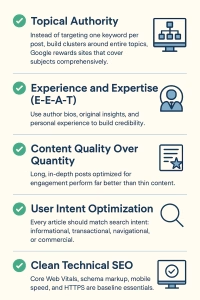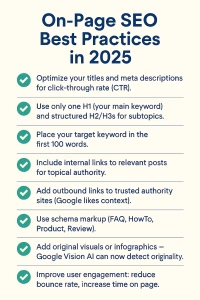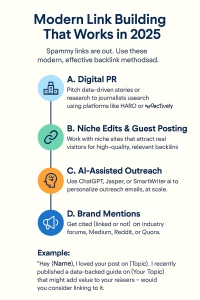How to Rank Your Website on Google?
The Short Answer:
if you want to rank your website on Google in 2025, focus on high-quality, experience-based content that builds topical authority. Use keyword clusters, optimize on-page SEO, and match every post to user intent. Earn trusted backlinks through digital PR and guest posts, and maintain fast, mobile-friendly pages with strong Core Web Vitals. Add schema markup, internal links, and original visuals. Finally, stay consistent — Google rewards expertise, trust, and websites that deliver real value to users over time.
Google SEO Practices Are Changing
If you’re starting a blog or building an affiliate website in 2025, you’ve probably noticed something: ranking on Google isn’t as simple as it used to be. The old days of keyword stuffing, cheap backlinks, and mass-produced “Web 2.0” sites are long gone.
Today, Google’s algorithm has evolved dramatically — focusing on experience, expertise, authoritativeness, and trust (E-E-A-T), user intent, and topic authority. But here’s the good news: it’s still possible to rank your website and make consistent affiliate income — if you follow a smart, modern SEO strategy.
Let’s break down, step-by-step, how to rank your website on Google in 2025 using proven, safe, and scalable methods.

1. Understand What Really Matters in 2025 SEO
In 2025, Google uses a blend of AI systems (like RankBrain and BERT) to understand content relevance, and user signals to determine ranking quality.
This means that now Google rewards websites that demonstrate topical authority by covering subjects in depth rather than targeting single keywords. Focus on creating high-quality, experience-driven content that showcases expertise (E-E-A-T) through author bios, insights, and authenticity. Prioritize comprehensive, engaging articles that align with user intent — whether informational or commercial — and ensure your technical SEO is flawless, with fast loading speeds, strong Core Web Vitals, mobile optimization, and secure HTTPS.
See the checlist below:

2. Keyword Research for 2025: Smarter, Not Harder
Long-tail keywords still matter — but now, it’s all about keyword clusters and semantic intent.
🔍 Tools to Use in 2025:
- Ahrefs or SEMrush — for keyword gaps and competitor insights
- SurferSEO or NeuronWriter — for on-page optimization and semantic keyword suggestions
- Google’s “People Also Ask” & Related Searches — for subtopics and questions to include
- ChatGPT + Keywords Everywhere Plugin — to generate keyword clusters quickly
💡 Strategy:
- Look for keywords with a Keyword Difficulty (KD) under 30.
- Combine long-tail and semantic variations naturally throughout your content.
Build topic clusters: one main pillar post (2,000+ words) surrounded by 5–10 supporting articles internally linked to it.
3. Build SEO Foundations: On-Page Optimization Checklist
Before thinking about backlinks, make sure your on-page SEO is airtight.
to optimize your on-page SEO in 2025, craft compelling titles and meta descriptions to boost CTR, use one clear H1 with well-structured H2s and H3s, and place your main keyword within the first 100 words. Strengthen authority by adding internal links to related posts and outbound links to reputable sites. Enhance your content with schema markup and original visuals or infographics that Google can recognize for authenticity. Finally, focus on user engagement — aim to keep visitors on your page longer and reduce bounce rates for stronger ranking signals.
Here’s your updated checklist for 2025:

4. Modern Link Building That Works in 2025
Forget about buying spammy backlinks or outdated Web 2.0 sites. Google’s algorithms in 2025 can easily detect manipulative link patterns. Instead, use these modern and effective link-building methods:
🏗️ A. Digital PR (Still King of Link Building)
Pitch data-driven stories, case studies, or unique research to journalists using:
- HARO (Help a Reporter Out)
- Connectively (the modern HARO alternative)
- Qwoted or Terkel.io
These platforms can get you backlinks from Forbes, HubSpot, Entrepreneur, and other high-authority domains.
🔗 B. Niche Edits & Guest Posting (White-Hat Versions)
Guest posting still works — but only if you do it right.
Look for niche-relevant websites with real traffic (1,000+ visits/month) and offer unique, high-value content.
Use tools like Postaga, BuzzStream, or Pitchbox for outreach.
🌐 C. AI-Assisted Outreach
AI tools like ChatGPT, Jasper, and SmartWriter.ai can help you write personalized outreach emails in seconds — while still sounding human.
Example:
“Hey [Name], I loved your post on [Topic]. I recently published a data-backed guide on [Your Topic] that might add value to your readers — would you consider linking to it in your article?”
🧱 D. Build Authority Through Brand Mentions
Brand mentions (even without links) count as trust signals now.
Get your brand mentioned on niche forums, Reddit, Quora, and Medium by:
- Sharing real advice
- Posting original research
Commenting with authority
🧠 E. Leverage AI Tools for Link Discovery
Use tools like:
- LinkWhisper – for internal link automation
- SurferSEO Grow Flow – for AI-suggested link opportunities
Hunter.io – to find verified outreach emails

5. The Role of Social Signals and User Engagement
Social signals are not direct ranking factors, but they boost visibility, engagement, and brand authority — all of which help indirectly.
Focus on platforms that are SEO-friendly in 2025:
- YouTube (video embeds and watch time increase dwell time)
- Pinterest (image backlinks + niche communities)
- LinkedIn Articles (authority links)
- Medium & Substack (great for cross-publishing content)
Use tools like Publer, Buffer, or Metricool to automate your social sharing while maintaining consistency.

6. Technical SEO and AI Integration
Technical SEO is the backbone of everything. Without it, even great content won’t rank.
⚙️ Key Areas to Optimize:
- Core Web Vitals: Use PageSpeed Insights or NitroPack to fix performance issues.
- Mobile Optimization: Test with Google Mobile-Friendly Test.
- Indexing Control: Use Google Search Console → Pages → Indexing to check crawl coverage.
- AI-Powered Site Audits: Tools like SiteGuru, Surfer Site Audit, and Screaming Frog AI Edition now automatically flag issues like duplicate content, schema errors, and slow-loading assets.
7. Content That Wins in 2025: Human + AI Synergy
AI-generated content alone won’t rank. But AI-assisted, human-edited content dominates the SERPs in 2025.
✅ Best Practice:
- Use ChatGPT or Jasper for outlines and first drafts.
- Add your own experience, case studies, and original opinions — this boosts E-E-A-T.
- Optimize readability with Hemingway App or Grammarly.
- Add multimedia: videos, images, infographics, and audio snippets for engagement.
Google’s “Helpful Content Update” (2023–2025) now heavily favors content written by people with real experience, even if AI helps create it.
8. Build Internal Authority With Smart Linking
Internal linking helps distribute PageRank throughout your website and tells Google which pages are most important.
Smart Internal Linking Strategy:
- Link new articles to your “money pages.”
- Use descriptive anchor text, not exact match keywords.
- Keep each page within 3 clicks from the homepage.
- Use LinkWhisper or SurferSEO Grow Flow to identify internal link opportunities automatically.
9. Track and Measure SEO Performance
You can’t improve what you don’t measure.
Use these 2025 tools to track your SEO progress:
- Google Search Console – for impressions, clicks, and indexing
- Ahrefs Webmaster Tools – for backlinks and keyword performance
- Microsoft Clarity – for heatmaps and user behavior
- Google Analytics 4 (GA4) – for engagement metrics and conversions
Pro Tip: Use Looker Studio (Google Data Studio) to create dashboards combining GSC, GA4, and Ahrefs data for a full SEO overview.
10. Bonus: Safe Link Velocity and Natural Growth
Google loves organic growth. Avoid adding hundreds of backlinks overnight.
Here’s a safe 2025 growth plan:
- Week 1–4: Focus on on-page SEO and social signals.
- Month 2: Add 5–10 quality backlinks from niche sites.
- Month 3–6: Build more guest posts and mentions.
- Month 6+: Keep growing naturally — consistency beats speed.
Also a relevant strategy, read here: What is Domain Authority Stacking
Final Thoughts: SEO Success in 2025
Ranking your website in 2025 is not about tricking Google — it’s about building real authority in your niche.
Focus on quality content, user intent, and trustworthy backlinks, and combine the power of AI tools with your own insights and authentic experience.
Remember:
Google doesn’t rank websites — it ranks the best answers.
If you become the best answer to your audience’s questions, rankings, traffic, and revenue will follow.
🧭 Quick Recap: Modern SEO Stack for 2025
| Category | Recommended Tools |
| Keyword Research | Ahrefs, SEMrush, ChatGPT + Keywords Everywhere |
| On-Page SEO | SurferSEO, NeuronWriter, Rank Math, Yoast |
| Link Building | HARO, Postaga, Pitchbox, Hunter.io |
| Technical SEO | SiteGuru, Screaming Frog AI, NitroPack |
| Content Creation | ChatGPT, Jasper, Grammarly, Canva |
| Analytics | GA4, Search Console, Clarity, Looker Studio |

